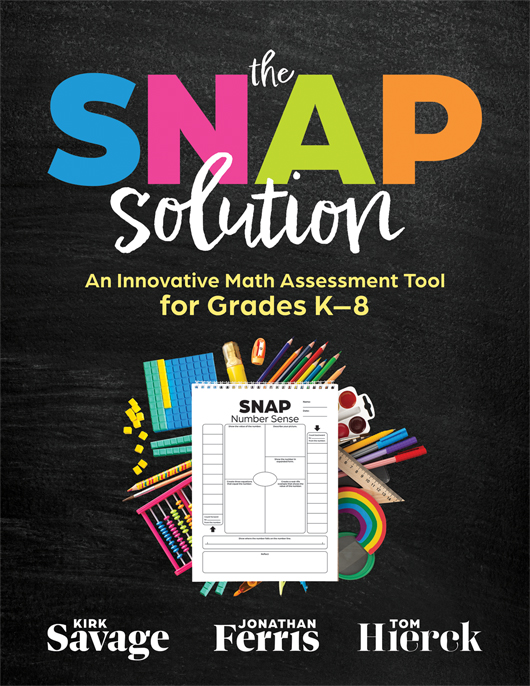Free Reproducibles
The SNAP Solution
An Innovative Math Assessment Tool for Grades K–8
Discover student numeracy assessment and practice (SNAP)—a practical approach to help classroom teachers evaluate number sense. With its simple and reliable method, K–8 math teachers can quickly implement SNAP in their daily teaching practices and ignite a sense of wonder and thinking for math in their students.
Benefits:
- Use the SNAP approach to help students learn number sense.
- Address each SNAP skill from kindergarten, primary, and intermediate teachers’ perspectives.
- Apply the SNAP method within the response to intervention model.
- Learn the five strands of mathematical proficiency aligned with each SNAP skill.
- Access templates and other resources.
TABLE OF CONTENTS
Introduction
Chapter 1: Exploring the SNAP
Chapter 2: Looking at Number Sense Foundations
Chapter 3: Understanding the Five Strands of Mathematical Proficiency
Chapter 4: Implementing the SNAP With Beginning Mathematicians
Chapter 5: Exploring Rubrics, Assessment, and Competency-Based Learning
Chapter 6: Understanding How the SNAP Supports Response to Intervention
Chapter 7: Looking at School and District SNAP Implementation
Epilogue: Final Word
Appendix A: SNAP Templates, Rubrics, and Classroom Profiles
Appendix B: Resources to Support Number Sense
REPRODUCIBLES
Introduction
Chapter 2
- Figure 2.1: Kindergarten Number Sense SNAP
- Figure 2.2: Number Sense SNAP Template
- Figure 2.3: The SNAP (Thousandths to Billions)
Chapter 3
Chapter 4
Chapter 5
Chapter 6
- Figure 6.3: Classroom Profile Sheet for the SNAP Template
- Figure 6.5: Sample Artistic and Themed SNAP Templates
- Figure 6.6: Zooming in on One Section at a Time in the SNAP Templates
Appendix A
SUGGESTED RESOURCES
Books
- Buffum, A., Mattos, M., & Malone, J. (2018). Taking action: A handbook for RTI at Work™. Bloomington, IN: Solution Tree Press.
- Buffum, A., Mattos, M., Malone, J., Cruz, L. F., Dimich, N., & Schuhl, S. (in press). Taking action: A handbook for RTI at Work™ (2nd ed.). Bloomington, IN: Solution Tree Press.
- Buffum, A., Mattos M., & Weber C. (2009). Pyramid response to intervention: RTI, professional learning communities, and how to respond when kids don’t learn. Bloomington, IN: Solution Tree Press.
- Buffum, A., Mattos M., & Weber C. (2012). Simplifying response to intervention: Four essential guiding principles. Bloomington, IN: Solution Tree Press.
- Hierck, T., & Weber, C. (2023). The road to success with MTSS: A ten-step process for schools. Bloomington, IN: Solution Tree Press.
- Wiliam, D. (2018). Embedded formative assessment (2nd ed.). Bloomington, IN: Solution Tree Press.
Websites
- JUMP Math
- Estimation 180
- Clothesline Math
- Daily Routines at Teach at the Speed of Learning
- Estimation 180 K–12
- GFletcher
- Mathematical Thinking by Carole Fullerton
- Number Talk Images
- The Recovering Traditionalist
- SavageBirdLearning
- Snap 33
- Steve Wyborney’s Blog
- Which One Doesn’t Belong?
- YouCubed K–12

